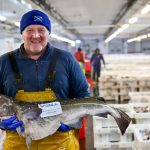It is the first time scientists from British Antarctic Survey (BAS) and the University of Birmingham reveal that the Antarctic ‘cod’ Notothenia coriiceps effectively ‘puts itself on ice’ to survive the long Antarctic winter. According to a study the fish activate a seasonal switch in ecological strategy, which means going from one that maximises feeding and growth in summer to another that minimises the energetic cost of living during the long Antarctic winter.
Scientists said that as Antarctic fish live in slow lane with extremely low rates of growth, metabolism and swimming activity it can further depress these metabolic processes in winter. Dr Hamish Campbell informed that the small winter reductions in water temperature that do occur are causing the measured decrease in metabolism.
Dr Keiron Fraser from BAS pointed out that for the first time such research was conducted in Antarctic using cutting edge technologies combining tracking of free swimming fish in the wild and heart rate monitors to allow the scientists to investigate just how these animals cope in winter with living in near freezing water and almost complete darkness for months on end.
Thus the study has given new insight of hibernation as a new group of animals that appear to utilize a hibernation-like strategy that allows them to survive during the long winters in one of the harshest environments on Earth.








